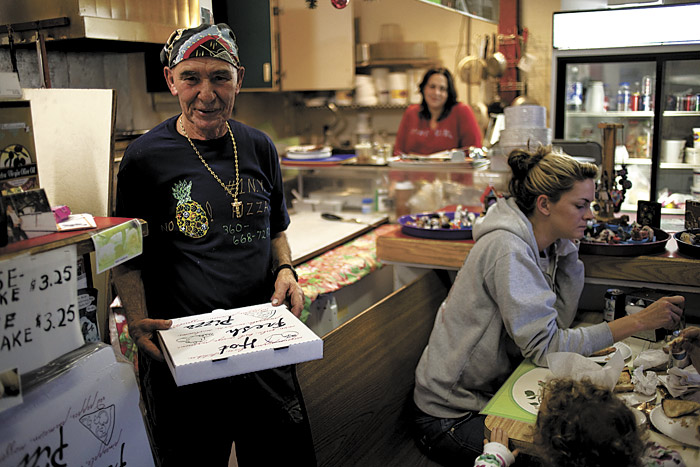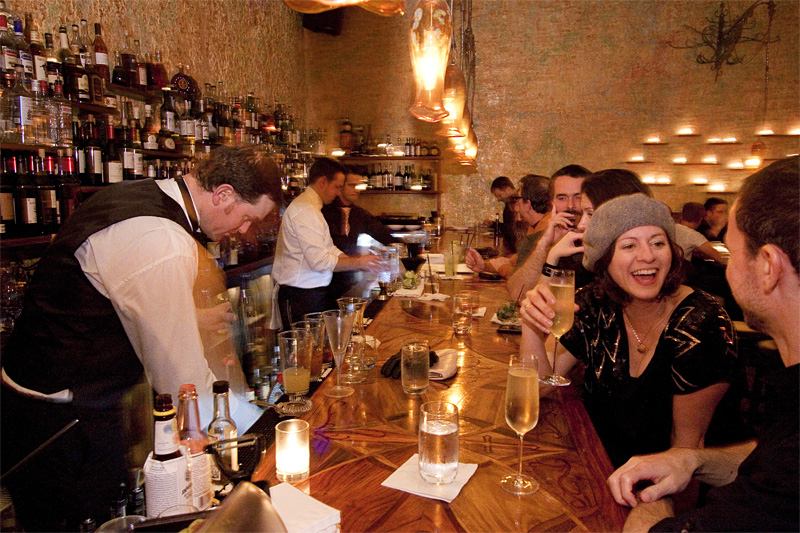Not for the first time, you find yourself at a wine tasting where the eavesdropping is more compelling than the Washington merlot in your hand. The woman pouring is telling the guy next to you how she’s house-sitting in Snohomish, where there’s a pizza place that sells the absolute best New York–style pizza in the state. “It’s run by this older couple who moved to this tiny town from New York,” she says. “Thing is, they’re only open certain days, so you have to call in and listen to the answering machine.” You butt in to ask what the name is, and she tells you Number 1 New York Pizza.
You find the phone number on the Web and call. A woman with the thickest Bronx accent you’ve heard on the West Coast answers. “I was just checking to see when you were open this week?” you say.
“When were you thinking of coming in?” she asks, her tone clipped and suspicious. You tell her Wednesday.
That’s OK then, she replies. “We’re sup-POSED to be closed for August. But on the days when HE comes in, we might as well open. What time were you thinking?” The two of you settle on 7.
The drive takes 45 minutes in rush-hour traffic: Across the 520 bridge, north through Kirkland and Woodinville, the highways narrowing as you turn onto State Road 9 and then pass through an intersection your iPhone identifies as downtown Clearview. Clearview appears to consist of a gas station and a couple of strip malls, patched-together buildings sharing unpaved parking lots and signs. You park at a narrow shop in the process of being striped red, white, and green, though the painters haven’t yet reached the roofline. A buxom woman painted on the window, standing next to three lap dogs, waves you inside. Welcome to Number 1 New York Pizza, and the world of Tony and Relita Ventura.
There are Seattle restaurants that take their inspiration from Le Corbusier—fat on white space, lean on clutter, where the purity of the design is supposed to intimidate you into silent reverie over the art you are about to consume. And then there’s the Venturas’ place.
Including the kitchen, it’s not much bigger than a Capitol Hill one-bedroom. Every surface, horizontal and vertical, is covered in the evidence of decades in business. Christmas garlands loop from the rafters over the kitchen, with TONY PLUS RELITA painted along the diagonal braces and = GOOD PIZZA on the horizontal strut. The walls, what used to be the takeout counter, and one of the three tables in the dining area are covered in small wood boxes, painted in intricate floral patterns, and handmade animal figurines. Larger, color-saturated canvases are stacked up against the counter, the patterns on them ranging from glorified chintz to jagged, rhythmic abstracts.
Relita, a 70-something woman with shoulder-length gray hair and a wary greeting, hands you menus and shuffles behind the counter to pat out a pizza, occasionally shooting concerned looks your way. It takes a while before you can focus on what to order, caught up as you are in reading the rules on the faded signs spilling down from the ceiling, each one tacked to the one above it. “We now have bell peppers,” one reads. Another states, “Please do not bring drinks. We have drinks.” You learn that credit cards are not accepted, and that even if the cook is rude your food will be prepared with special care.
Meanwhile, a man in his late 60s who looks like a retired Hell’s Angel is standing at the other booth. His creased, oak-colored skull is wrapped in a red bandanna, and he’s talking rapidly at the family sitting there in a Sicilian accent so thick you have to tune into it, catching half the words and making up the rest. When he walks behind the counter, you realize he is the Tony of TONY PLUS RELITA. You also start to notice photos of him pasted up around the walls.
“You ever seen my face?” he eventually greets you with. From where? you ask. “In the paper. On the bus. A guy told me I’m on a billboard in Oregon.” He walks behind the counter, pulls out a Seattle Times, and brings it over: He’s the star of an ad campaign there for Providence Cancer Care Partnership. The tagline is “Survived food critics. And lung cancer.”
You talk a while, he putters off into the back room behind the kitchen, and Relita comes over to take your order, unleashing a motherly grin as she arrives; it quickly flees behind a frown of concern, then re-emerges again. You realize, with not a little relief, that she’s worried for you, not about you.
The photocopied menu—”Take it home!” Relita tells you—lists pizzas, baked sandwiches, and a few dinners, all basic American Italian food of your childhood, and your parents’ childhoods, too. You order a pepperoni pizza with olives, with a salad on the side. Baked ziti, too. Baked ziti only seems appropriate here.
Relita returns to the counter to make your salad, while explaining to the family across the aisle that the Venturas are bringing someone on to learn the recipes and keep the business going in case Tony gets sick again. The new girl’s the one responsible for the painting, while Tony is emptying out the back room in order to expand.
At one point he comes over. “My pizza’s like her,” he says, pointing to your tablemate.
“Beautiful?” you ask.
“Exquisite?” her boyfriend echoes.
“Clean,” Relita clarifies for us.
“You know, no so heavy on the makeup,” Tony continues. “Maybe she wear a little lipstick, maybe a little something around the eyes, but she don’ need it. Most pizzas are so heavy on the toppings, but not mine.”
Your friend doesn’t hear Tony correctly, thinking he’s telling her she should put more effort into the way she looks. “Should I be complimented or insulted?” she says to Tony, who doesn’t quite hear her either. He moves on to talking about how Norwegians can’t drink (as Italians can).
You and your friends silently exchange fluttering smiles that agree on two points: 1. These guys are great. 2. What the hell are they going to do next?
Your salads come in plastic bowls set on “God Bless America” placemats, the romaine lettuce tossed with black olives, thinly shaved red onions, and deep red cherry tomatoes in a sharp Italian dressing dosed with dried basil. You’ve been eating the same pizza-parlor salad since you were old enough to like lettuce, and you tuck in contentedly.
Meanwhile, you half-hear Tony and Relita squabble over their shopping list and where the rest of the cheese is stored. Suddenly you’re 6 again, sitting at a formica counter in Florida with a glass of orange juice and a cluster of vitamin bottles in front of you, and your grandmother and grandfather are having the same argument in the same exasperated tones. That’s when you realize: I’m not in a restaurant. I’m in someone’s living room.
At some point, Tony rolls up a few things, sticks them under his arm, and walks out the door. The Tony show is over. The Relita show begins. While she pulls the pizza out of one of the two small tabletop ovens and brings it with paper plates (two per person), she tells you all about the work Tony started when he recovered from cancer. “HE is expanding the restaurant and applying for a beer-and-wine license,” she says aggrievedly. “I said, ‘Tony, why now?’ When we came here from Lynnwood 13 years ago, I asked about beer and wine, and he said no. And now he wants beer and wine! Why now? I’m 74! You know, he’s knocking down the wall back here himself. Meanwhile, I’m trying to fill out the paperwork for the liquor license.” She shows you the to-scale plans she’s trying to draw on graph paper for the LCB. You chat about liquor licensing, their move from New York 25 years ago, Tony’s plans for the back, and their animals—the dogs in the window are just three of her pack, and she makes reference to a macaw and a horse.
Frankly, the pizza’s not as good as the pies you’ve eaten at Grimaldi’s in Brooklyn or even Hot Mama’s in Seattle. It’s thin, with an evenly golden crust, with an airy bulge here and there but otherwise denser than the thin-crust pies you love best. The slice emits a loud snap as you fold it, spitting a fat dollop of tomato sauce onto your paper plate. The tomato sauce is brighter than many, which you like, but the pie is too thickly paved with cheese and toppings to taste the crust underneath—and that’s the best part, after all. The baked ziti comes tossed with the tomato sauce mixed with fat dollops of ricotta. It’s also covered in what must have been a fat fistful of shredded mozzarella, which pools creamily in the center of the plate and blisters around its edges, and you eat as much as you can. Since you love fresh pizza in all its forms, flawed and perfect, you also down every one of your apportioned slices. So do your tablemates.
So the pizza’s not exactly Number 1. This is still one of the most enjoyable restaurant meals you’ve eaten all year. You think about how accustomed you’ve become to treating restaurants as business transactions, and how scripted are your interactions with waiters—they miss one line of the script, and you primly note the error. In contrast, Tony and Relita inhabit this cluttered room, bringing everyone who enters into their swirling loops of conversation and endless projects. Anyone who enters is welcome, from the family who leaves before you, with two tiny children expectantly clutching their suckers, to the young couple who walks in, learns about the cash-only rule, and exits, looking slightly stunned by the garrulous owners.
As you pack up to go, Relita hands you the check, looking a little disappointed in you. She tells you to definitely try the cannoli next time. “Tony’s been making them since he was 7,” she says. You look at your friends. They look at you. Pretty soon, Relita’s pulling a plastic tub out of the fridge and a shell from the back, and presenting you with a pastry tube filled with chocolate-chip-studded ricotta cream and corked with candied cherries and orange peel. You take a bite and are awed by the flaky crunch, the mild sweetness of the filling, the bright shock of the candied fruit. Then you and your friends greedily pass the cannoli among you as if it’s the best blunt you’ve ever smoked. It’s gone in seconds. You drive home, arguing over which of your other friends would enjoy the road trip and which should stick to Tutta Bella. You agree that you will give the friends you do send to Number 1 New York Pizza one vague piece of advice, refusing to explain further:
Ask Tony for an Italian kiss.






